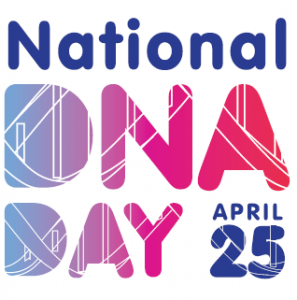Apr
24

Posted by Carolyn Martin on April 24th, 2018
Posted in: Health Literacy, Health Observances
Tags: genetics, genomics
 April 25th marks the 15th anniversary of the completion of the Human Genome Project. The National Human Genome Research Institute (NHGRI) is commemorating this milestone and other genomic advances by showcasing 15 ways that genomics has transformed our world. From April 5 through April 25 you can learn about a new milestone in genomics that has transformed our world such as:
April 25th marks the 15th anniversary of the completion of the Human Genome Project. The National Human Genome Research Institute (NHGRI) is commemorating this milestone and other genomic advances by showcasing 15 ways that genomics has transformed our world. From April 5 through April 25 you can learn about a new milestone in genomics that has transformed our world such as:
Check out the ’15 for ’15 Celebration to read all 15 ways genomics has impacted our world as well as other DNA Day events.